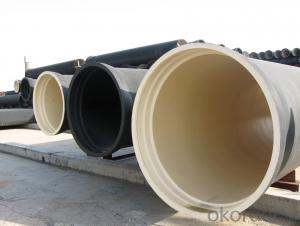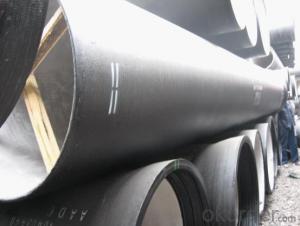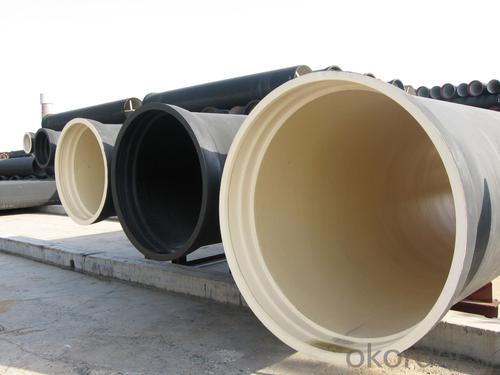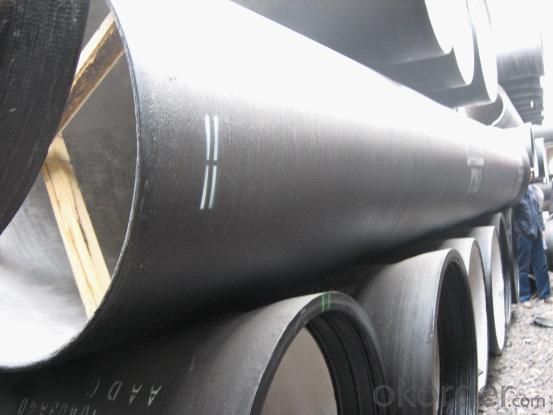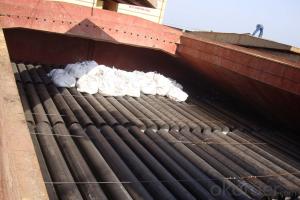T Type Ductile Iron Pipe DN2000
- Loading Port:
- China Main Port
- Payment Terms:
- TT OR LC
- Min Order Qty:
- -
- Supply Capability:
- -
OKorder Service Pledge
OKorder Financial Service
You Might Also Like
1) The standard of pipe: ISO2531:1998, EN545:2006,K9 K8
2) Effective length: 6m/5.7m
3) Inner cement line: Portland cement lineas per ISO4179
4) Zinc coating: at least 130g/m2 as per ISO8179
5) Bitumen painting: at least 70μm as per ISO8179
6)With 102% quantity of NBR, SBR, or EPDM ring asper ISO4633
7) DN80-DN1200
8) Highstrength, lighter than grey iron, good corrosion resistance, no furring, smallflow resistance, easy fixing, long life tome about 100 yeas
9)Checked by automatic inspection equipment
10) Composition:
Chemical composition | |||
Chemical composition | Ductile Cast Iron Pipe (%) | Grey iron pipe (%) | Steel pipe (%) |
C | 3.5-4.0 | 3.2-3.8 | 0.1-0.2 |
Si | 1.9-2.6 | 1.4-2.2 | 0.15-0.4 |
Mn | 0.15-0.45 | 0.4-0.6 | 0.3-0.6 |
P | ≤0.06 | ≤0.3 | 0.02-0.03 |
S | ≤0.02 | ≤0.1 | 0.02-0.03 |
Mg | 0.03-0.06 |
|
|
11) Feature:
Mechanical properties | |||
| Ductile Cast Iron Pipe | Grey Iron Pipe | Steel Pipe |
Tensile Strength(Mpa) | ≥420 | 150-260 | ≥400 |
Yield Strength(Mpa) | ≥300 | No Confirmation | No Confirmation |
Bending Strength(Mpa) | ≥590 | 200-360 | ≥400 |
Elongation (%) | ≥10 | Neglected | ≥18 |
Brinell Hardness(HBS) | ≤230 | ≤230 | About 140 |
12) T type mechanical joint
13) Packing: in bulk or container
PACKING: 1) Pipesare bundled together with the steel belt.
2) Wooden pieces are put between the pipes.
- Q: What are the differences between ductile cast iron pipes and centrifugal ductile iron pipes?
- Centrifugal casting is a casting method. Ball milling cast iron pipe is a kind of material.
- Q: Are ductile iron pipes suitable for use in cold climates?
- Yes, ductile iron pipes are suitable for use in cold climates. Ductile iron possesses excellent resistance to low temperatures, making it highly suitable for use in freezing conditions. Its high durability and strength enable it to withstand extreme temperatures and harsh weather conditions commonly found in cold climates.
- Q: The role of chromium in nodular cast iron
- In the bending fatigue test of crankshaft, it is also found that the chromium containing cast nodular iron crankshaft has the characteristics of large ultimate bending moment, high safety factor, overload duration, high strength and small deformation.
- Q: How does ductile iron pipe perform in areas with high soil contamination?
- Due to its inherent strength, durability, and corrosion resistance properties, ductile iron pipe is highly effective in areas with high soil contamination. The material used in manufacturing these pipes is highly resistant to chemical attack, making it suitable for handling various types of contaminated soils, including those with high levels of acids, alkalis, and other corrosive substances. The corrosion resistance of ductile iron pipes is primarily due to their protective internal and external linings. These linings are designed to prevent contact between the pipe material and the surrounding soil or fluids, acting as a barrier that prevents the penetration of corrosive elements and reduces the risk of pipe degradation or failure. Additionally, external coatings or cathodic protection systems can further enhance the resistance of ductile iron pipes to soil contamination, extending their service life. Compared to materials such as steel or concrete, ductile iron pipes offer significant advantages in areas with high soil contamination. Their high strength enables them to withstand external loads imposed by the contaminated soil, reducing the risk of structural failure or deformation. Furthermore, the inherent flexibility of ductile iron allows it to absorb ground movements or settlement without compromising its integrity, making it a reliable choice for areas prone to soil instability or shifting. Moreover, the smooth internal surface of ductile iron pipes minimizes friction and maintains efficient flow rates, even in the presence of contaminants. This is particularly important in areas with high soil contamination, where debris or sedimentation can accumulate and hinder fluid flow. The smooth bore of ductile iron pipes reduces the risk of clogging and ensures the continuous and reliable conveyance of fluids, even in challenging soil conditions. In conclusion, ductile iron pipe is an excellent choice for areas with high soil contamination. Its exceptional corrosion resistance, strength, flexibility, and smooth internal surface make it a reliable and durable solution for conveying fluids in these challenging environments.
- Q: How are leaks repaired in ductile iron pipe?
- Leak repairs in ductile iron pipes vary depending on the severity and location of the leak. One technique commonly used involves the application of epoxy-based sealants or leak repair clamps. For small leaks, epoxy sealants are commonly utilized. A specialized epoxy compound is applied to the leaking area, which then hardens and forms a durable seal. The epoxy is carefully spread on the pipe's surface, covering the leak and any surrounding damage. This method effectively addresses small leaks and offers a long-lasting solution. In cases where the leak is larger or more severe, leak repair clamps are often utilized. These clamps secure tightly around the pipe using rubber gaskets and bolts to provide a mechanical seal. The clamp's pressure compresses the gasket onto the pipe, creating a watertight seal and preventing further leakage. Leak repair clamps come in various sizes to accommodate different pipe diameters. Proper preparation of the pipe surface is crucial before applying either repair method. The area around the leak must be thoroughly cleaned and dried to ensure good adhesion of the epoxy or proper sealing with the clamp. It is also essential to adhere to the manufacturer's instructions and guidelines for the chosen repair method to achieve a successful and long-lasting repair. It is important to note that these repair methods are temporary solutions and may not be suitable for all situations. In cases of extensive pipe damage or aging infrastructure, it may be necessary to replace the affected pipe section entirely. It is recommended to seek professional assessment and guidance from qualified technicians or plumbers when dealing with leaks in ductile iron pipes. This ensures proper repairs and minimizes the risk of future issues.
- Q: Can the underground cast iron pipes be connected with clamps to form buttress?
- The clamp hoop is a connecting device for connecting pipe fittings, valves and pipe fittings with grooves. Used in the fast joint between the role of tightening, the general two joints with gaskets, rubber, and silicone, ptfe.
- Q: What are the advantages of using ductile iron pipe?
- Using ductile iron pipe in various applications offers several benefits. Firstly, ductile iron pipe is renowned for its strength and durability. It possesses higher tensile and yield strengths compared to other pipe materials, making it highly resistant to cracking, bending, and breaking. This exceptional strength enables the pipe to withstand high-pressure and heavy-load conditions, making it an ideal choice for applications such as water and sewage systems, oil and gas pipelines, and industrial piping. Secondly, ductile iron pipe exhibits excellent corrosion resistance. It is coated with a protective layer, typically zinc or epoxy, which prevents rusting and corrosion. This coating ensures a longer lifespan for the pipe, even in harsh environments or when transporting corrosive fluids. Another advantage of ductile iron pipe lies in its flexibility. Unlike rigid pipes, ductile iron pipes possess a certain level of flexibility, enabling them to endure ground movements and settle without fracturing. This flexibility proves particularly advantageous in areas prone to earthquakes or soil settlements. Additionally, ductile iron pipe boasts a smooth inner surface, minimizing flow resistance and enhancing fluid transportation efficiency. It also reduces the likelihood of sediment accumulation or corrosion within the pipe, resulting in improved flow rates and decreased maintenance requirements. Furthermore, ductile iron pipe proves cost-effective in the long run. Although it may entail higher initial costs compared to other pipe materials, its durability and minimal maintenance needs make it a cost-effective choice over time. The extended lifespan of ductile iron pipe reduces the necessity for frequent replacements and repairs, contributing to lower overall life-cycle expenses. Lastly, ductile iron pipe exhibits environmental friendliness. It is manufactured using recycled materials, and its extended lifespan diminishes the need for frequent replacements, thereby reducing the carbon footprint associated with manufacturing and transportation. In conclusion, the utilization of ductile iron pipe offers numerous advantages, including exceptional strength, corrosion resistance, flexibility, smooth inner surface, cost-effectiveness, and environmental friendliness. These qualities establish it as a reliable and preferred option for various applications across diverse industries.
- Q: What is the weight of ductile iron pipe compared to other pipe materials?
- Ductile iron pipe is generally heavier compared to other pipe materials. Its weight can vary depending on the size and thickness of the pipe, but generally, ductile iron pipe is denser and has a higher weight per unit length compared to materials like PVC, HDPE, or steel. This higher weight of ductile iron pipe is primarily due to its composition, which includes iron and carbon, making it a sturdy and durable option for various piping applications.
- Q: What's the difference between ductile iron pipe and cast iron pipe?
- We have to correct now basically all socket ductile iron pipes, because the socket type with a rubber ring, plus a ductile material, buried beneath it when the bearing has a certain flexibility, not because of the deformation and leakage phenomenon. To be used, not Unicom cast iron pipe socket, connection is used similar to the stainless steel hoop hoop sleeve closed.
- Q: Are ductile iron pipes suitable for use in seismic areas?
- Ductile iron pipes are indeed appropriate for usage in seismic regions. The strength and durability of ductile iron enable it to endure seismic forces and ground motions linked to earthquakes. Its exceptional flexibility and high tensile strength provide resistance against cracking or fracturing in highly challenging circumstances. Furthermore, ductile iron pipes have exhibited their trustworthiness and appropriateness in seismic zones over an extensive period. Nevertheless, to optimize their efficiency and mitigate any probable risks, it is crucial to adhere to appropriate installation methods and seismic design principles.
Send your message to us
T Type Ductile Iron Pipe DN2000
- Loading Port:
- China Main Port
- Payment Terms:
- TT OR LC
- Min Order Qty:
- -
- Supply Capability:
- -
OKorder Service Pledge
OKorder Financial Service
Similar products
Hot products
Hot Searches
Related keywords
